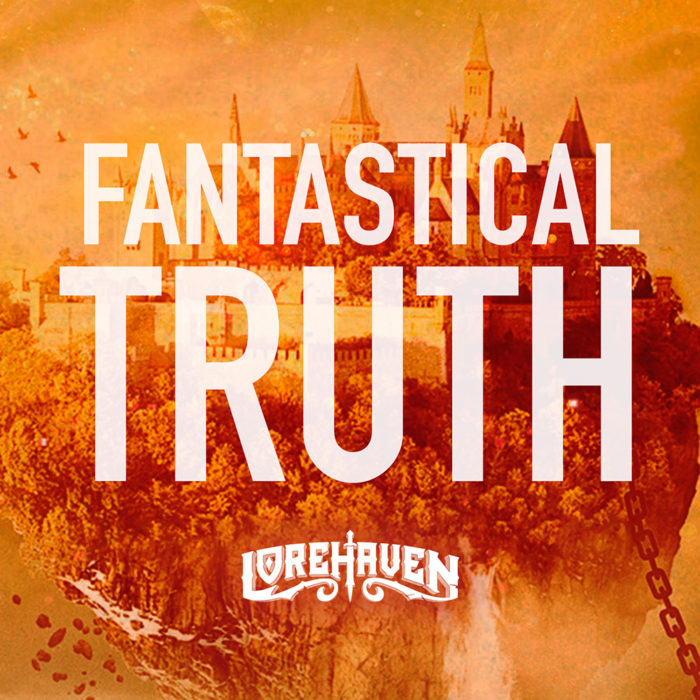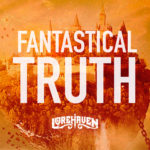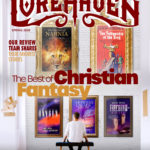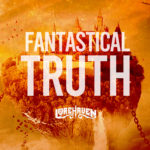Fantastical Truth Asks: How Did You First Discover Fantastical Stories?
Since last week, our new Fantastical Truth podcast has achieved perfect liftoff.
Spoiler alert: this Tuesday, Lacy Rhiannon (my wife!) joins us to explore the magic of dance in Sharon Hinck’s new novel Hidden Current.
Meanwhile, my cohost Zackary Russell and I are already planning episode 6 and beyond. In this episode, we want to feature listeners even more.
Our topic: fan origin stories.
We’re asking: how did you first discover fantastical fiction?
We’d love to hear your origin story, which could include elements like:
- How old were you?
- How did you find the story?
- What did you love about it?
- What ideas really spoke to you?
- Which characters draw you in?
- What did you love about the world?
- How do you feel about that story now?
You can use this page’s comment section. Or use the form here to send your note straight to the Fantastical Truth mailbag.
Either way, we’d love to hear your story! And of course we may share your story in next month’s Fantastical Truth episode, for hundreds (so far!) of other fantastical story fans.
Godspeed!
Stephen












































I don’t remember what my first fantastical story was. My mom always encouraged my sister and I to like reading and creativity, so stories have always been important to me. One of the first things I got attached to were animal centric stories, so movies like Balto and Lion King were faves. Shows like Quest For Camelot and Swan Princess got me into medieval fantasy. During first grade I was obsessed with the Peter Pan Broadway play, and during third grade my fave books were The Swiss Family Robinson and The Girl Who Owned A City by O. T. Nelson.
There were tons and tons of other things I watched and read that impacted me. Most of them had to do with animals, nature, fantasy or interpersonal conflict/combat.
A lot of what spoke to me was characters struggling against themselves or society in some way. I tended to gravitate toward the serious chars, especially if they were cool and competent in some way, though they weren’t the ONLY ones I liked. Part of why those factors appealed to me because from a young age I knew from observation that life was kind of cruddy and I wanted to be able to handle whatever happened, no matter how hard it was. So when I saw characters that were serious, cool and competent, I watched and learned from how they dealt with harsh situations.
They couldn’t always figure out solutions to their problems, so another thing I learned from them was how to cope when things went bad. Or to analyze exactly what caused their problems in the first place so I could prevent them from happening in my own life.
More recently, some of my favorite characters have been Kiritsugu from Fate Zero, Itachi from Naruto Shippuden, and Swiftkill from Kay Fedewa’s Blackblood Alliance. Kiritsugu’s interesting because he helped me articulate some of my beliefs a little more. Mainly in the sense that I don’t believe that one person can/should try to force the entire world to change, because that could easily lead to tyranny, abuse and bloodshed. Improving one piece of the world at a time is better, or at least more realistic. Kiritsugu illustrated that by chasing the Holy Grail’s power to grant his wish for world peace, only to realize the Grail could only fulfill that in a very horrific way. Kiritsugu only found a semblance of peace after he stopped chasing a perfect world and instead just helped the people that were still in his life.
Itachi’s compelling because he’s a good, caring person, but had a very short and tragic life because circumstances forced him to make a hard choice. His story arc is very intricate, and any little part of it can be examined and questioned. ‘What if Itachi refused to go through with the Massacre?’ ‘What if he told his little brother that their family was going to betray the village?’ etc. And then there’s an arc of forgiveness and redemption between him and his brother that’s very well done.
Swiftkill is interesting because she’s a cool and serious character with lots of room for growth. The Blackblood Alliance was rebooted recently, and has so many great hints of where its plot will go. Swiftkill’s always been an outsider, so she’ll probably have to struggle a lot with resentment and forgiveness in many many areas, like her half sister Bloodspill, the Inarian wolves, or… heck, even society itself.
For all three of those shows, I liked the way their worlds were presented. Naruto’s story world feels very three dimensional, like it’s very broad and detailed beyond what the main chars are doing. That’s probably partly because the world’s premise includes several large nations in rivalry with each other. We don’t get to see all of that, but the ninja villages that protect each nation are certainly at odds with each other, and the series has gone on long enough to show many hints of the politics spanning multiple generations of nations and ninja clans.
Fate Zero and The Blackblood Alliance don’t show as much world building, but the settings still feel immersive and realistic. Like, Fate Zero doesn’t invent a bunch of new countries with new customs. But it does give complexity to the chars’ situations, and we’re shown many tidbits of mage society that way. It’s story world is much like ours, but has a dark underbelly filled with mages. The story scratches the surface of the abilities, history and politics of those mages, but does so in a way that indicates there’s far more than what the chars encountered during the show.
Thanks much, Autumn! Lots of great details there!
The first fantastical story I remember was my mom reading me Jeri Massi’s Bracken series (The Bridge, Crown and Jewel, and The Two Collars, by BJU Press). I was 6. I fell in love with the princesses, the danger, and the intrigue, but especially with the “wise woman” who tied all of the books together with her bravery and healing. I’ve reread the books many times, shared them with younger siblings, and still have them on my shelf.
My introduction to fantastical stories came around age 3, I guess. I say “I guess” because the details come more from hearing my parents share their memories of it than my own hazy, fleeting memory-fragments of early childhood.
In my bedroom, my parents provided a little cassette player and some of those Disney “read-along” book and cassette tape sets. Little me was very fond of these, and spent hours listening to the stories, looking at the colorful little books (many of which were filled with stills from said company’s animated films), and dutifully turning the pages “when you hear the chime ring like this: *chime.*” The book and tape that I loved above all others was The Hobbit, which was adapted from the 1977 Rankin-Bass animated film (which I still vastly prefer to Peter Jackson’s bloated cash-grab). I don’t know if it was the exciting sound effects, voices, story, or combination of whatever elements, but it was so captivating that I memorized the whole thing and would recite it (with voices, sound effects, and all) at family gatherings.
It would be a few years before I could read The Hobbit myself, but that’s probably the single tale that fired and nurtured my love of the fantastic. Quests. Mysterious wizards. Dangerous monsters and narrow escapes. Secret passages. Evil to be vanquished and wrongs to be righted. Even if my three-year-old brain couldn’t really comprehend it all, it was seared into my brain at a very formative age. How could I not end up being hooked by stuff like this?
With my preschooler brain thus fully primed, my parents then took five-year-old me to see Star Wars in the theater (a 1980 rerun before Empire Strikes Back came out.) Predictably, my mind was utterly blown, and before the opening scene finished I was a F&SF convert.
[…] After a break next week, we’ll explore the question: How did you first discover fantastical stories? […]